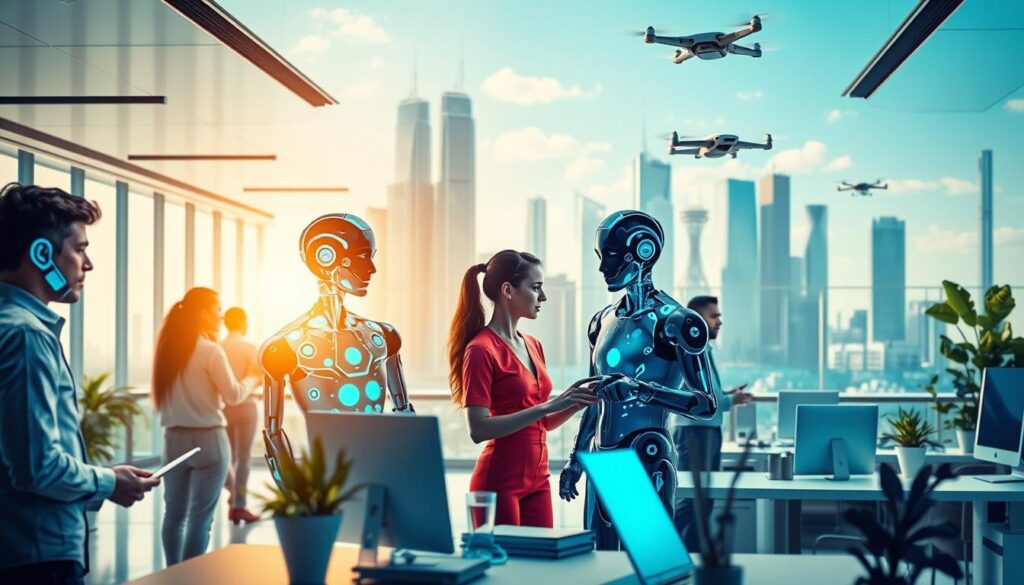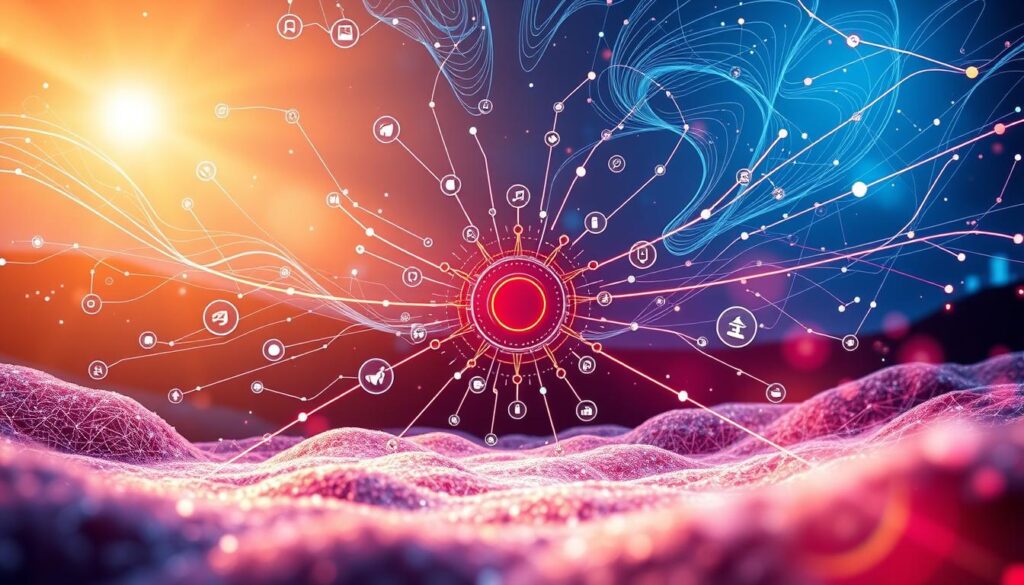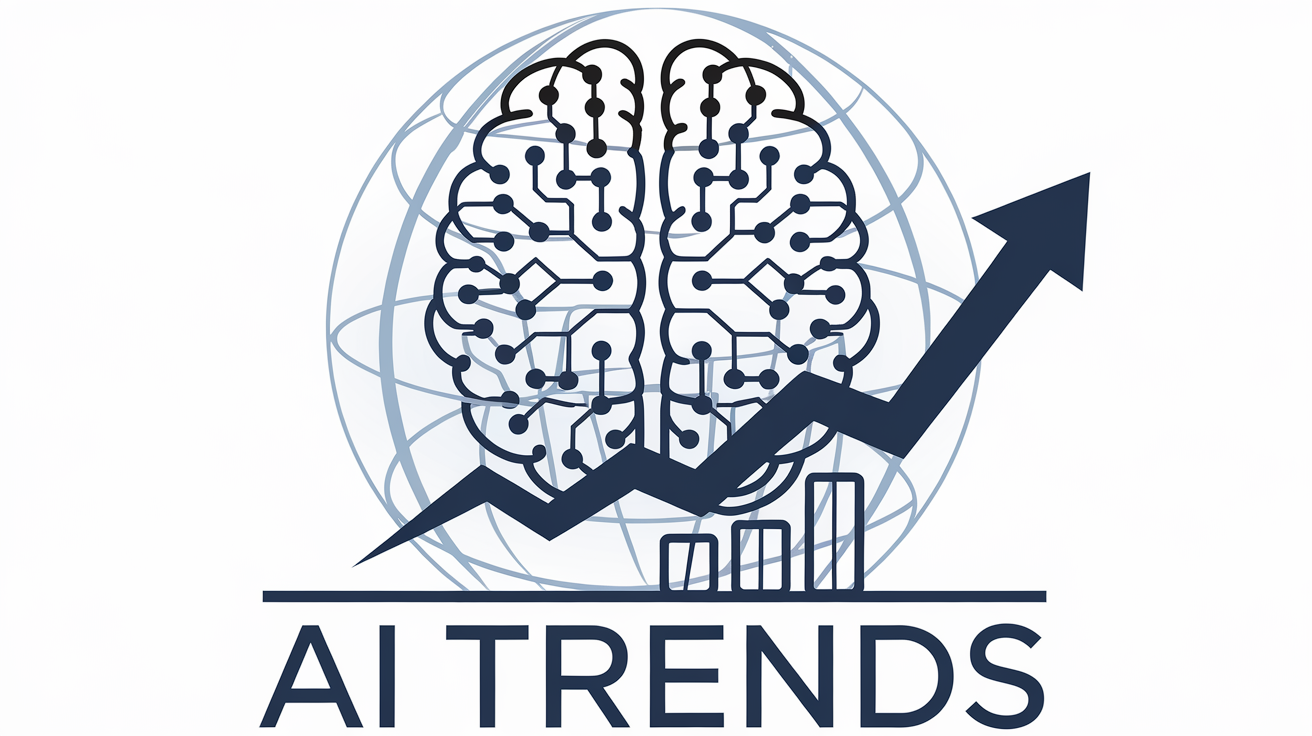AI is now a part of our work lives. It automates tasks and changes industries. This shift impacts everyone, from new workers to leaders, bringing both challenges and new chances.
It’s important for professionals to understand these changes. AI isn’t just taking jobs; it’s opening new ways to innovate. Companies like Google and Amazon use AI to make things more efficient. But the impact goes beyond them, touching every field. The goal is to learn how to work with this technology.
Table of Contents
ToggleKey Takeaways
- AI transforms job markets by automating routine tasks.
- Adapting to AI improves career resilience.
- New roles in data analysis and AI management are emerging.
- Continuous learning is critical to staying competitive.
- Artificial intelligence in the workplace boosts productivity when integrated thoughtfully.
The Current State of AI in the Workplace
Today, artificial intelligence in the workplace is changing industries fast. Companies that started early are seeing big gains. They’ve found that AI boosts efficiency and sparks new ideas, but it doesn’t replace people.
Industries Leading AI Adoption
- Finance: Banks like JPMorgan Chase use AI to quickly process loans and spot fraud.
- Healthcare: Hospitals, like Mayo Clinic, use AI for quicker diagnoses and finding new drugs.
- Manufacturing: Tesla’s factories use AI robots for precise assembly.
- Retail: Amazon’s AI chatbots handle 90% of customer questions all day, every day.
Key AI Technologies Transforming Work
Important AI technology in workforce tools include:
- Machine learning: It predicts trends in sales and supply chains.
- Natural Language Processing (NLP): It powers virtual assistants and customer service tools.
- Predictive analytics: It optimizes inventory and energy use in real time.
Case Studies: AI Implementation Success Stories
| Company | Industry | AI Application | Outcome |
|---|---|---|---|
| JPMorgan Chase | Finance | Contract analysis via COiN platform | Cuts 360,000 hours of legal work annually |
| Mayo Clinic | Healthcare | AI tumor detection system | 90% faster diagnosis accuracy |
These stories prove artificial intelligence in the workplace is real and making a difference today.
Understanding the AI Revolution in Employment
AI is changing how we see work. It’s not just another tool; it’s transforming the very idea of work. Automation and employment now meet in new ways, making old job roles less relevant. Machines do repetitive tasks quicker, but this change isn’t just about jobs disappearing.
It’s about finding new value in creativity, solving problems, and connecting with others. Companies like Amazon and Tesla show how digital transformation in businesses boosts efficiency and creativity.
“The workplace of tomorrow will prioritize adaptability over seniority.” — Global Workplace Institute, 2023
Workplaces are changing too. Old-fashioned hierarchies are giving way to flatter, project-based teams. The rise of gig work and remote jobs shows this shift. Platforms like Upwork are leading the way.
Global trends and aging populations are speeding up these changes. Industries like healthcare and education must adapt or risk being left behind.
Younger people entering the workforce are driving faster tech adoption. They see lifelong learning as essential, not optional. Embracing these changes means focusing on skills AI can’t do. The AI revolution is about growth and new chances, not just fear.
Jobs at Risk: Where Automation is Making the Biggest Impact
Automation is changing jobs faster than expected. It’s not just assembly lines and retail that are changing. Offices and professional roles are also feeling the impact. Machine learning is now used in legal research, financial analysis, and even in creative writing tools.
Routine Task Automation: Who’s Affected?
Manufacturing, transportation, and retail are leading in automation. Robots are taking over 40% of warehouse tasks in the U.S., a 2023 MIT study found. By 2025, jobs like cashiers and data entry could see a 30% reduction.
White-Collar Disruption: When Algorithms Take the Office
Legal firms use AI to review contracts, helping junior lawyers. ChatGPT can draft reports, and accounting software can handle tax filings. A PwC report says 30% of white-collar jobs could change by 2030.
Timeline Projections: How Fast Change Is Coming
By 2030, up to 30% of tasks in white-collar roles could be automated, according to a McKinsey Global Institute report.
- By 2025: 20% of manufacturing roles may integrate AI systems.
- 2030: Legal and finance sectors anticipate 35% task automation.
Geographic Variations in Job Displacement
Places like California and Germany are seeing changes faster. But, developing economies with less tech are changing slower. EU rules on AI in healthcare slow changes there compared to Asia-Pacific.
These changes are big, but knowing about them helps workers prepare. The future needs skills like creativity and emotional intelligence. These are things machines can’t do.
AI and the Future of Work: Emerging Opportunities
Automation is changing industries, but it’s opening up new chances. AI is creating jobs that didn’t exist before. It combines human skills with machine power to move us forward.

New jobs are popping up everywhere. Companies are looking for AI ethics consultants to make sure algorithms are fair. They also need human-AI team coordinators to manage teams that work with AI. And, machine learning engineers are in high demand to make systems that make work easier without taking over.
There are three main ways humans and AI work together:
- Co-pilots: AI does the data work, so humans can focus on the big picture.
- Advisors: AI gives insights, but humans make the final call.
- Augmenters: Tools like generative AI help in design or medical work, making things better without replacing people.
In healthcare, AI quickly checks scans, letting doctors spend more time with patients. In schools, AI tailors lessons, while teachers focus on teaching critical thinking. ai and the future of work is about working together, not replacing each other.
“AI’s greatest value isn’t replacing, but re-imagine,” explains a 2023 World Economic Forum report. “Humans gain time to innovate while systems handle repetition.”
Things like empathy, creativity, and making ethical choices are what make us human. As AI does the routine stuff, we can do the jobs that need our special touch. The future is about working together to reach new heights.
Essential Skills for the AI-Driven Economy
As ai technology in workforce changes jobs, some skills will be key to success. These skills help humans work well with automation. They make sure we keep up with the future job market trends.
- Technical skills: Data literacy, coding basics (Python/R), and systems thinking.
- Human-centric strengths: Creativity, ethical decision-making, and emotional intelligence.
- Metacognitive strategies: Adaptability, lifelong learning, and problem-solving agility.
| Skills at Risk | Skills in Demand |
|---|---|
| Routine calculations | Data analysis with AI tools |
| Predicable task repetition | AI oversight and optimization |
| Basic document formatting | AI-aided strategic planning |
“The future job market trends will reward those who combine technical fluency with uniquely human traits.” — World Economic Forum, 2023
For instance, marketers use ai technology in workforce tools to tell stories in their campaigns. Engineers mix coding with creativity to come up with new ideas. It’s about having both technical skills and soft skills like teamwork and thinking critically.
Take courses like Coursera’s AI for Everyone or LinkedIn Learning’s Data Literacy Fundamentals. Learning these skills helps you lead in a world where humans and AI work together.
Adapting to Change: Strategies for Professional Resilience
To thrive in today’s job market, you need to take proactive steps. This includes adapting to digital transformation in businesses and understanding machine learning impacts on jobs. Here are some strategies to help you build a career that’s ready for the future:

Continuous Learning Approaches
- Sign up for online courses on platforms like Coursera or LinkedIn Learning, focusing on AI.
- Attend webinars to keep up with the latest trends in your field.
- Collaborate with others in communities like GitHub or local tech groups.
Building Transferable Skills
| Skill | Why It Matters | Examples |
|---|---|---|
| Critical Thinking | Helps you understand complex data patterns from machine learning. | Use tools like Tableau or Python scripting. |
| Adaptability | Is key in a workplace that’s always changing. | Learn about cloud platforms (AWS, Azure) or automation software. |
Leveraging AI Tools for Career Advancement
- Use AI tools like Grammarly or Canva to boost your productivity.
- Try AI assistants like ChatGPT for learning new skills.
- Use apps like Degreed to track your career progress.
Creating Your Personal Transition Plan
Follow this 3-step plan:
- Assess Now: Check your current skills against what the industry needs.
- Plan Ahead: Set goals for skill upgrades over the next 3-5 years.
- Act Daily: Spend 1 hour each week learning new tools.
Resilience isn’t about predicting the future. It’s about being agile when change happens. Taking small steps every day lays the groundwork for tomorrow’s chances.
Ethical Considerations in the AI Workforce Transition
As artificial intelligence in the workplace changes jobs, we face big ethical questions. It’s important to make sure AI is fair in hiring, promotions, and reviews. Companies need to check their AI systems to avoid bias towards certain groups or backgrounds.
“Fairness isn’t optional—it’s foundational to trust in AI systems.” — World Economic Forum, 2023
- Algorithmic Bias Mitigation: Big tech like Amazon stopped using biased hiring tools after finding gender bias in their ai technology in workforce tools.
- Retraining Equity: Governments and companies need to support programs that help low-income workers and areas with little internet access.
- Privacy Safeguards: AI that watches people in real-time makes us worry about privacy. We need clear rules that protect workers’ rights while keeping things efficient.
Being open is crucial. Workers should know how AI judges their work and what data it uses. Rules must keep up with artificial intelligence in the workplace changes, making sure everyone is treated fairly. Working together, we can make sure technology helps us grow, not hold us back.
Conclusion: Embracing the AI Future with Confidence
AI is changing the future job market trends in big ways. It brings both challenges and chances. Just like the internet, AI will create new jobs, not just replace old ones.
People who keep learning will do well. Jobs in healthcare, logistics, and creative fields will change, not disappear. AI will take over simple tasks, letting humans focus on new ideas and plans.
Success comes from combining technical skills with human qualities like empathy and thinking critically. Sites like LinkedIn Learning and Coursera offer AI courses to help professionals stay ahead. Companies like IBM and Google use AI wisely, keeping human touch and ethics important.
Seeing AI as a partner, not a rival, is key. Those who use AI tools now, like analyzing data or creating AI-driven marketing, will grow. The future is for those who are curious and resilient, turning change into a chance for new beginnings.
FAQ
How is AI affecting the current job market?
AI is changing the job market a lot. It automates simple tasks and creates new jobs. While some jobs might disappear, many industries are getting better thanks to AI.
Will AI replace all jobs in the future?
AI won’t replace all jobs. It will change how we work. Many jobs will use AI to help us do more complex tasks.
What are some examples of industries leading AI adoption?
Finance, healthcare, manufacturing, and customer service are leading in AI use. They use AI to make things better and improve customer service.
How can I prepare for the impact of AI on my career?
To get ready for AI’s impact, work on skills like emotional intelligence and problem-solving. Keep learning through school or online to stay adaptable.
Are there specific job roles that AI is expected to create?
Yes, AI is making new jobs like machine learning engineers and AI ethics consultants. These roles help manage and develop AI in different fields.
How does AI address ethical concerns in the workplace?
AI can bring up issues like bias and privacy. Companies and governments need to set rules to ensure fairness and protect privacy in AI use.
What are some essential skills for the AI-driven economy?
Important skills include data literacy and programming. Also, human skills like ethics, creativity, and communication are becoming more valuable as AI changes work.
You may also like: AI-Powered HR: Revolutionize Your Workforce

